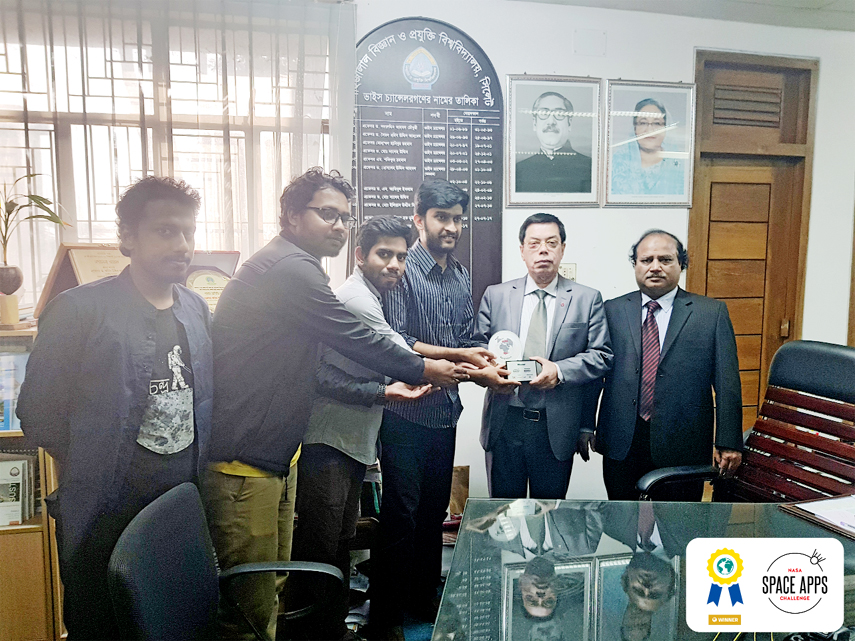
Mahedi Kabir, SUST :
“Lunar VR”, a moon-based app created by a team namely ‘Olik’ from Shahjalal University of Science & Technology (SUST), Sylhet won the “Best use of Data” category in the NASA Space Apps 2018. This is the first time from the Bangladesh both landed the shortlist of finalists and won in the challenge. The members of the team representing Bangladesh are: Assistant Professor of Computer Science and Engineering Department of SUST Biswapriyo Chakraborty (Mentor), SM Rafi Adnan from Physics, Kazi Mainul Islam, Abu Sadiq Mahdi and Sabbir Hasan from Geography and Environment Department.
Mentor Biswapriyo Chakraborty Said, we team Olik, created a virtual immersive experience which will bring moon close to us like never before. Only 12 astronauts have walked on the moon in the history of mankind. So, it is quite rare to be this close to the moon. In Lunar VR we tried to give the user an opportunity to explore the moon and marvel at its beauty. We created a virtual assistant to help user go through the entire experience. We call her ‘Luna’.
Congratulating the winning team, Prof Farid Uddin Ahmed, Vice Chancellor of SUST said, “We are very proud of this success. We hope the teachers and the students of the university will achieve such success in the international arena. And any kind of assistance will be done in this kind of work.
The entries came from more than 2,729 teams of students and young professionals in 75 countries who underwent a weekend-long hackathon in October 2018 to propose solutions or apps for global problems by adapting open-source data from NASA. Five other winners from around the world were picked for each of the remaining categories, namely Galactic Impact; Best Use of Hardware; Best Mission Concept; Most Inspirational; and Best Use of Science. The winning teams will be invited to visit the Kennedy Space Center in Florida.
‘Lunar VR’ has been created using various data provided by NASA. Through the App, anyone can take the experience of NASA Apollo 11 missions landing area and other circumstances. The user can interact with the first footprints, the lunar module, moon rocks and the surroundings. And another experience is orbiting the moon with the LRO satellite. Data collected by LRO has been described as essential for planning NASA’s future human and robotic mission to the moon. Craters like Copernicus, Kepler and Aristarchus can be seen from up above.
“Lunar VR”, a moon-based app created by a team namely ‘Olik’ from Shahjalal University of Science & Technology (SUST), Sylhet won the “Best use of Data” category in the NASA Space Apps 2018. This is the first time from the Bangladesh both landed the shortlist of finalists and won in the challenge. The members of the team representing Bangladesh are: Assistant Professor of Computer Science and Engineering Department of SUST Biswapriyo Chakraborty (Mentor), SM Rafi Adnan from Physics, Kazi Mainul Islam, Abu Sadiq Mahdi and Sabbir Hasan from Geography and Environment Department.
Mentor Biswapriyo Chakraborty Said, we team Olik, created a virtual immersive experience which will bring moon close to us like never before. Only 12 astronauts have walked on the moon in the history of mankind. So, it is quite rare to be this close to the moon. In Lunar VR we tried to give the user an opportunity to explore the moon and marvel at its beauty. We created a virtual assistant to help user go through the entire experience. We call her ‘Luna’.
Congratulating the winning team, Prof Farid Uddin Ahmed, Vice Chancellor of SUST said, “We are very proud of this success. We hope the teachers and the students of the university will achieve such success in the international arena. And any kind of assistance will be done in this kind of work.
The entries came from more than 2,729 teams of students and young professionals in 75 countries who underwent a weekend-long hackathon in October 2018 to propose solutions or apps for global problems by adapting open-source data from NASA. Five other winners from around the world were picked for each of the remaining categories, namely Galactic Impact; Best Use of Hardware; Best Mission Concept; Most Inspirational; and Best Use of Science. The winning teams will be invited to visit the Kennedy Space Center in Florida.
‘Lunar VR’ has been created using various data provided by NASA. Through the App, anyone can take the experience of NASA Apollo 11 missions landing area and other circumstances. The user can interact with the first footprints, the lunar module, moon rocks and the surroundings. And another experience is orbiting the moon with the LRO satellite. Data collected by LRO has been described as essential for planning NASA’s future human and robotic mission to the moon. Craters like Copernicus, Kepler and Aristarchus can be seen from up above.

